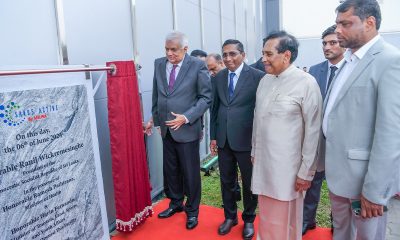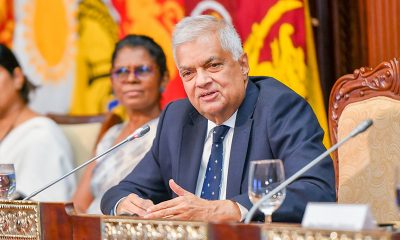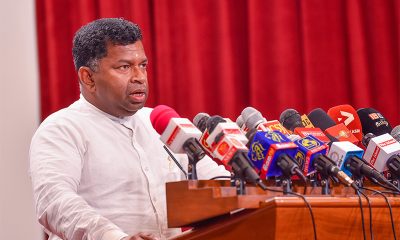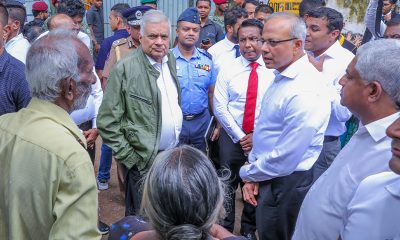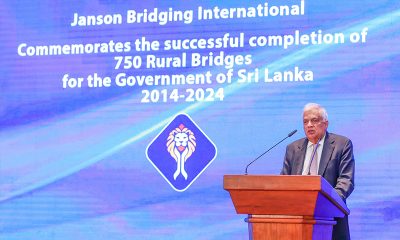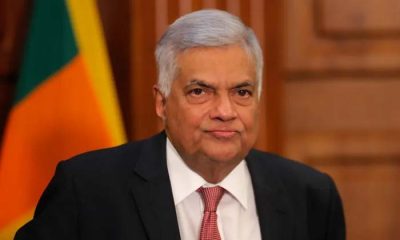Editorial
Trial balloon?

Nobody can be faulted for being deeply suspicious of the various ongoing moves of the government to make changes to the country’s electoral laws ahead of upcoming elections due within the next few months. President Ranil Wickremesinghe, as everybody knows, is serving out the former president’s term of office which ends in November next year when a successor must take office.
Thus the presidential election process must kick off some weeks earlier by August/September – that is less that one year down the road. The local government elections scheduled for last year, for which nominations were called for and received earlier this year, were not held on the grounds that there was no money to conduct an election. In this context it is obvious to one and all that the government funks elections, be they provincial, local or national, and will try every trick in the book to delay them for as long as possible. Hence the trial balloons.
Although some kind of normalcy has been achieved since the shambles of 2022 when Gotabaya Rajapaksa was ejected from the presidency and his brother, Mahinda, from the prime ministry, both the president and his government, despite many brave words, are very well aware that they are not top of the pops as far as the electorate is concerned.
This is also true of the president’s UNP and the Rajapaksa SLPP which elected and keeps him in office. It is not necessary to labour the fact that life is extremely difficult for ordinary people although the affluent continue to wine and dine at five star hotels and restaurants at prices that defy the imagination. Certainly, last week’s staff level agreement with the IMF and the current expectation that the delayed second tranche of the previously negotiated Extended Fund Facility will be available in the short term, together with the news that some debt sustainability arrangement with China is in the offing, leaves some room for optimism.
But the country is clearly not over the hill. IMF assistance comes at a price and coming weeks will see new shocks for sure. Electricity charges went up 18% from Friday. Recent rainfall flooding many parts of the country which brought some hydro-electricity generating reservoirs to near spill level should obviously have been taken this to account when deciding on a new tariff. There was no mention in the Public Utilities Commission’s (PUCSL) Friday news release on whether this was the case. The public has a right to this information and ideally the Minister and the CEB will have an early news conference on the subject in the interest of transparency.
The electricity price will obviously have a wide ranging knock-on effect. Apart from ordinary households, manufacturing industries will be confronted with higher production costs that will have to be passed down to consumers. Export industries like garments are already feeling the pinch of shrinking order books. There has to be an effect on most essential sectors. Fuel prices were raised recently but judging by Colombo traffic there does not appear to be a price-induced reduction of consumption. We are truly a ‘clean suit empty pocket’ race as the saying goes.
In this space last week we discussed possible candidates for the presidency and also made the point that more important than who will run is whether elections will be held on schedule. In any society undergoing the economic shock therapy that is our lot at present, it is vital that safety valves are opened on schedule so that public hope of a chance for change is not frustrated. The presidential election next year is the first scheduled election and it is in this context that the appointment of a nine-member commission headed by a former Chief Justice Priyasath Dep has created a degree of suspicion in the public mind that a process of not holding elections until its work is done has begun. The commission has been mandated to propose changes to the voting system and address many other election related matters. While many of these have been crying for attention for a long time, neither the president nor his government enjoy the public trust that they will not attempt to delay elections if that is to their advantage.
No time frame for the completion of the work of the commission has been set. Among the matters within the commission’s terms of reference is whether an individual be permitted to contest in both parliamentary and provincial council election. There has been no demand anywhere for such a provision as far as we know, and what the president’s reasons for examining such a possibility is not yet in the public domain. Last Sunday we ran a feature in this paper of Mr. RG Senanayake contesting both the Kelaniya and Dambadeniya seats at the 1956 general election and winning both seats. Senanayake was reputed to have raised both hands when a vote by a show of hands vote was called!
Whether anything is cooking following the Supreme Court determination that a minister who defected from the party from which he was elected had lost his seat. There are many defectors sitting in the incumbent parliament and reports suggest that some of them are getting jittery. But law professor GL Peiris, responding to a question at a press conference of the Dullas Alahapperuma faction of the SLPP, said that they had voted for the SLPP candidate against the UNP candidate Ranil Wickremesinghe. There has yet been no attempt by the SLPP to expel them from the party endangering their seats, he said, but if there was, they would strongly resist it.
Editorial
Ensure safety of COPF Chairman

Saturday 8th June, 2024
It was with shock and dismay that we received the news about death threats to COPF (Committee on Public Finance) Chairman Dr. Harsha de Silva over the ongoing parliamentary probe into the on-arrival visa scam. Dr. de Silva yesterday told Speaker Mahinda Yapa Abeywardena, in Parliament, that he was facing death threats and intimidation, and it was incumbent upon Parliament to ensure his safety. He stopped short of naming names, but revealed that some ruling party MPs were among those who had ganged up against him. The Speaker only said there had been no complaint, and he would look into the matter.
The SLPP-UNP government has been doing everything in its power to have all parliamentary committees under its thumb. The COPE (Committee on Public Enterprises), which once helped restore public faith in the legislature by exposing state sector corruption, has now become a mere appendage of the incumbent regime, thanks to the appointment of SLPP MP Rohitha Abeygunawardena as its Chairman. The SLPP-UNP combine also tried to oust COPF Chairman Dr. de Silva, but in vain. However, it knows more than one way to shoe a horse.
The COPF, under Dr. de Silva’s chairmanship, has been a thorn in the side of the government, which is struggling to cover up numerous corrupt deals. Dr. de Silva yesterday told Parliament that he found it extremely difficult to function as the COPF head due to severe resource constraints his committee was facing; he himself had to pay the salaries of some of his staff members besides burning the midnight oil.
The sheer workload he had to cope with as the COPF chief had taken its toll on his health, he said, informing the Speaker that he was at the end of his tether, and at times thought of resigning from the COPF. This is exactly what the government wants him to do; resource squeezes and threats are aimed at making him quit.
On 26 May, Dr. de Silva revealed, in an ‘X’ post, that the COPF had uncovered some vital information about the visa scam and it would reveal everything after its final meeting on the issue; the COPF was committed to exposing the truth behind the controversial tender, he added. In an editorial comment on 27 May, we warned him.
While thanking him for his bold stand, we pointed out that by making such a statement, he had thrown caution to the wind, and become a marked target, with the government making an all-out effort to delay the COPF investigation lest the truth should come out much to the detriment of its interests in this election year. Unfortunately, what was feared has come about; Dr. de Silva is complaining of death threats and government moves to strangulate the COPF financially to derail its investigations.
Dr. de Silva’s predicament exemplifies the fate that befalls the few good men and women in Parliament. It is hoped that all those who seek an end to the state sector corruption will rally behind Dr. de Silva, and bring pressure to bear on the government to ensure his safety. Let Dr. de Silva be urged to reveal the names of those who have issued threats, veiled or otherwise, to him and are trying to scuttle the COPF probes.
Editorial
Dead man walking!

Friday 7th June, 2024
The SLPP-UNP government is going hell for leather to make bad laws as if there were no tomorrow. It is abusing its parliamentary majority, which has been retained with the help of some crossovers, for that purpose. The Opposition, the media and trade unions are up in arms, and understandably so. The incumbent regime is a dead man walking; it is so desperate that it is capable of anything. Hence the need for it to be restrained.
The Electricity (Amendment) Bill (EAB) plunged Parliament into turmoil yesterday, but the government secured its passage. The Supreme Court (SC) determined the entire EAB inconsistent with the Constitution and recommended changes thereto. After unveiling the Bill, sometime ago, Minister of Power and Energy Kanchana Wijesekera hailed it as an excellent piece of legislation aimed at straightening up the power sector to serve the public interest better.
The SC determination left him with egg on his face. He reminded us of the proverbial curate who, while eating a stale egg, assured his host, a Bishop, that parts of it were excellent. Wijesekera’s egg, as it were, made Parliament stink yesterday, but he sought to please his masters by praising it as a silver bullet.
EAB should have been discarded and a new one drafted in consultation with all stakeholders. But the government is apparently driven by an ulterior motive; its aim is not to serve Sri Lanka’s interests but to look after those of some moneybags.
It is not uncommon for Bills to contain some flaws, which are rectified either before or during the committee stage. But there is something terribly wrong with draft Bills that are full of sections inconsistent with the Constitution. The drafters of EAB have demonstrated their sheer ignorance of the supreme law, and that they are not equal to the task of drafting Bills. If they had read the Constitution at least perfunctorily, they would not have drafted such a bad law.
Ignorant and incompetent, they do not deserve to be paid with public funds and must be sent back to law school. They must be summoned before Parliament and questioned on their serious lapses, which have caused public faith in the national legislature to diminish.
Curiously, the MPs who demand that judges, doctors, Central Bankers, and other public officials be summoned before Parliament have taken badly drafted Bills for granted. The power sector trade unions yesterday alleged that EAB was of Indian origin and geared towards furthering the interests of Adani Group at the expense of Sri Lanka.
Most critics of EAB are agreeable in principle to the need for power sector reforms; the Ceylon Electricity Board should be given a radical shake-up, and transformed into a modern organisation capable of providing a better service at a lower cost. They only asked the government to tread cautiously, consulting all stakeholders and taking action to ensure that the country’s interests prevailed over everything else. But the government was in a mighty hurry to steamroller the Bill through Parliament, making the Opposition ask whether it was doing so at the behest of some external forces involved in controversial power generation deals here.
What is passed by the current Parliament can be either amended or abolished by a future parliament in a constitutionally prescribed manner. But that does not mean that a government is free to pass bad laws, making the country enter into long-term agreements with powerful nations and their investors. It looks as if the SLPP-UNP regime did not care two hoots about the consequences of its actions.
Editorial
Modi Magic on the wane

Thursday 6th June, 2024
The outcome of India’s parliamentary election (2024) has led to a ‘perspective ambiguity’. Prime Minister Narendra Modi lost no time in declaring victory for the BJP-led NDA alliance, which secured 293 seats in the 543-member Parliament, but he must be a worried man. The BJP is short of 32 seats to form a government under its own steam; it has lost 63 seats or about 20% of its parliamentary strength. It had 303 seats in the previous Parliament, and that number has dropped to 240.
Modi has become the second Indian Prime Minister to win a third term. The first PM to do so was Jawaharlal Nehru. But Nehru won an outright majority in Parliament in 1962; Modi has had to depend on smaller parties in his alliance to retain his hold on power. Modi must be reeling from a sharp drop in his victory margin in his own constituency, Varanasi; it has decreased to 152,000 from 480,000 in 2019 whereas Modi’s bete noire, Rahul Gandhi, won Raebareli by a staggering 390,000 votes.
Modi, who reigned supreme with 303 seats in the previous Parliament, is now dependent on parties such as Nitish Kumar’s JD-U and Chandrababu Naidu’s TDP to form a government. He has had to lead an alliance of strange bedfellows. Both Kumar and Naidu were bitter critics of Modi. Kumar helped form the oppositional alliance, the INDIA bloc, before switching his allegiance to PM Modi. Naidu also closed ranks with the BJP in the run-up to the election. These politicians have been described as extremely ambitious and highly unpredictable, and whether Modi will be able to manage them and consolidate his grip on the NDA alliance remains to be seen. They will demand plum ministerial posts in return for their support. The TDP is said to be eyeing Transport and Health portfolios! That is the name of the game in coalition politics, where it is not uncommon for the tail to wag the dog, so to speak. These two political leaders are however not the only problem Modi will have to contend with. The next five years will feel like an eternity for PM Modi.
Nothing would have been more shocking for the BJP than its defeat in Uttar Pradesh’s Faizabad constituency, where the Ram Mandir has been built. Modi may have thought he would be able to win the Lok Sabha election hands down after the consecration of that temple, which became a centrepiece of the BJP’s election campaign. The BJP lost that seat to the Samajwadi Party! Modi must be disappointed that the Ram Mandir hype failed to trigger a massive wave of support for his party. This particular defeat signifies a massive setback for the BJP’s ethno-religious agenda.
Modi’s divisive election campaign failed to yield the desired result. The BJP’s failure to secure an outright majority could be attributed to a host of factors, some of them being the suppression of the Opposition, the arrogance of power, chronic unemployment, and the rising cost of living. The BJP also did not care to reimage itself in a positive light to attract the youth.
Modi will hereafter see the Congress-led INDIA bloc with 223 seats, in his rearview mirror. The Congress (99 seats) and its allies have eaten into the BJP support base considerably, but they have a long way to go before being able to capture power.
The bumpy ride ahead for the BJP-led coalition government to be formed may improve the INDIA bloc’s chances of bettering their electoral performance and turning the tables on the BJP and its allies in time to come. Modi will have a lot to worry about in his third term.


